Engineering students set to pay more

Education, science and technology cabinet secretary Prof Jacob Kaimenyi before the Committee on Appointments at KICC on May 9, 2013. Photo/FILE
Engineering and medical students in public universities are to pay more than those studying arts-based courses, a new plan by the government shows.
Cabinet Secretary for Education Jacob Kaimenyi on Tuesday said the new plan, commonly referred to as ‘Differentiated unit costing’, shall be enforced in three months.
In the same vein, university lecturers shall be paid according to their disciplines, said Prof Kaimenyi during a meeting with vice-chancellors of private universities in Kenya.
“Recruitment of the members of the board that shall set the particular amounts for unit costing is under way. We expect that the board shall be functional in three months,” he said.
It is not yet clear how much each of the degree programmes will cost, but Prof Kaimenyi stated that a formula had been crafted to determine the cost of teaching each one.
The change is in line with the recently-enacted Universities Act that will see the establishment of a Universities Fund to determine the amounts to be paid in each degree programme.
The Fund will determine the amount lecturers in private and public universities will earn.
“Trustees of the Fund shall establish the minimum discipline differentiated remuneration for academic staff of universities, which shall be fair and globally competitive, and advise the government accordingly,” article 54 of the Act states.
However, the Kenya Association of Private Universities (Kapu) expressed concerns that by implementing the unit costing in public universities, fees charged in their institutions would be affected because of the forces of a free-market.
This will mean that the private universities will not charge a figure higher or lower than that has been capped at the public universities – otherwise they will lose students or have an influx depending on the fees charged per course.
“The differentiated unit cost should reflect actual average costs of degree programmes and not just what is in the public sector since they are subsidised,” said Kapu boss Prof Freida Brown, who is also the vice chancellor at the United States International University.
The vice chancellors had paid a courtesy call to Prof Kaimenyi who was accompanied by Principal Secretary Nominees Colleta Suda and Belio Kipsang.
Permanent Secretary Crispus Kiamba said the Universities Fund will also determine the voucher-system that will liberalise student admissions.
With the voucher-system in place, Prof Kiamba said, a student will be free to choose a university and degree programme of their choice unlike the current situation where the Joint Admissions Board (Jab) determines this for the students.
Prof Brown welcomed the move, saying that it sets the students free to pursue courses of their choice.
Already, the agency to replace Jab – Kenya Universities and Colleges Central Placement Service – is being set up to coordinate admissions in public and private universities as well as mid-level colleges.
Prof Kiamba revealed that a team of higher education officials have travelled to Britain to get input on their admission process.
During the meeting held at Jogoo House, the vice chancellors also pitched for an end to preferential treatment to public universities in terms of funding and grants allocation.
“Although the Universities Act has assured all universities will have similar rights and privileges, the two tier system appears to continue,” Prof Brown said, citing cases where their charters are significantly delayed.
“The overall concern is that there is little political will to support the private sector.”
Other issues they raised during the meeting included cheaper work permits for scholars and private sector representation in the Commission for University Education.




